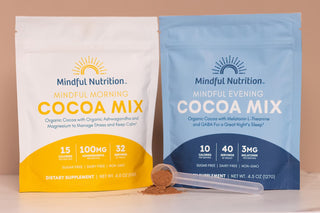Are you looking for a natural supplement to support healthy sleep habits? Exploring the potential benefits of GABA supplements is a smart place to begin on your path to R&R.
Certain supplements, like gamma-aminobutyric acid (GABA) can help you take charge of your sleep patterns. So, let’s explore what GABA is and its relationship to your body’s many functions.
Key Takeaways
- GABA is a naturally occurring amino acid in the body that is associated with relaxation.
- GABA can be found in various foods, but can also be consumed orally as a supplement (such as in our Mindful Evening Cocoa Mix).
- Some studies explore GABA’s potential role in supporting calmness and overall wellness.
See Related: 6 Natural Sleep Aids for Better Sleep in 2025
How Does Gamma Aminobutyric Acid (GABA) Affect Relaxation?
It may come as no surprise that sleep quality can influence how you feel during the day. From feeling tired to experiencing low energy, many people notice the effects of restless nights.
Some individuals exploring natural relaxation options may come across GABA as a dietary supplement. While it is less well-known than compounds like melatonin, some research suggests GABA may play a role in supporting relaxation and evening calm.
GABA is a naturally occurring neurotransmitter that is involved in relaxation pathways. Some research suggests it may play a role in supporting calmness and overall wellness.

What Does GABA Have to Do With Rest?
“Sleep patterns can influence how the body and mind feel throughout the day. Some people explore dietary supplements, including GABA, as part of routines intended to support relaxation and evening calm.
So, how might GABA be associated with relaxation and winding down before bedtime?
Does GABA Make You Sleepy?
“GABA interacts with pathways in the nervous system associated with relaxation. This is because GABA is the brain’s main inhibitory neurotransmitter, which means it has the power to calm or “pump the brakes” on the brain’s activity for a period of time.
It achieves this by binding to GABA receptors on the brain’s neurons, reducing their ability to fire. This process can tame nerve cell hyperactivity by blocking specific signals in the nervous system, leading to a greater overall balance and promoting calm. When it comes to bedtime, GABA interactions with inhibitory neurotransmitters may be linked to relaxation.
This “off switch” to the brain can be extremely powerful when it comes to R&R. In fact, GABA’s effects on the body go way beyond just relaxation. GABA may be able to promote calmness and relaxation.
Information About GABA and Relaxation
It can be difficult to determine the extent to which GABA supplementation can impact sleep patterns. However, science has shed some light on supplemental GABA.
One study suggests that GABA is absorbed by the body within a 30-minute timeframe. According to the study, consuming 100 mg of GABA for a week was shown to reduce sleep latency while increasing non-rapid eye movement sleep time.

Can GABA Found in Foods Help Promote Sleep?
Some studies suggest that GABA found in fermented foods may have an effect on sleep patterns.
Another study highlighted GABA’s impact after stressful activity, in which researchers found that GABA had the ability to slow down brain waves.
Although GABA is naturally occurring within our bodies, consuming GABA-rich food supplements can also lead to potential benefits. Surprisingly, many foods you may already be consuming as part of a regular diet may contain GABA, from fermented milk to whole grains.
Some foods and beverages that contain GABA include:
- Green tea
- Black tea
- Oolong tea
- Kefir
- Yogurt
- Fava beans
- Lentils
- Seafood
- Nuts
- Berries
- Spinach

Do Low Levels of GABA Impact Relaxation?
You may be wondering how much GABA your body produces naturally, and whether that amount is enough to support healthy sleep function.
After all, low levels of GABA in the body have been shown to impact relaxation, but various other body functions can be impacted, too. In fact, there are several effects associated with low GABA.
This is reason enough to become more familiar with GABA!
Bonus: 5 Health Benefits of Drinking Hot Chocolate
How Can GABA Affect Daily Life?
The truth is that not getting enough sleep may affect alertness and daily functioning. Yet, this is still a common issue seen in adults today.
While the number of hours needed for optimal sleep can vary from person to person, it’s generally suggested that adults get between 7-9 hours. Adults who sleep less than the recommended 7-9 hours may experience lower energy, concentration difficulties, or mood changes.
According to the National Heart, Lung, and Blood Institute, nearly one-third of adults report not getting enough sleep every day. Sleep plays a crucial role in maintaining overall strong health. So, what happens when a lack of sleep begins to affect your physical and mental state?
Some research suggests GABA may play a role in supporting relaxation and a sense of calm in the evening.
Sleep patterns may influence how alert or refreshed a person feels, and some studies explore possible links between sleep and immune system function. This is why confronting sleep issues head-on and exploring solutions makes good sense when striving for overall wellness.
How Does GABA Affect the Gut?
There is conflicting evidence on whether oral gamma-aminobutyric acid (GABA) supplements are effective in the long term. Some dietary supplements combine magnesium or L-theanine with GABA, which may support relaxation or evening calm, according to preliminary research.
One example is our Mindful Evening Cocoa Mix, which contains a premium blend of gamma aminobutyric acid (GABA), melatonin, and L-theanine for a great night's sleep. It's best taken before bed as a part of your nighttime routine.

There is also evidence to suggest that GABA’s effects on the gut can lead to other potential benefits, as the gut contains many GABA receptors. Some research is exploring how GABA-containing probiotics, sometimes called psychobiotics, may be associated with relaxation and mood regulation.
How Does GABA Interact With Other Medicines?
GABA works naturally within our bodies, but it’s important to note that many medications can interact with GABA receptors in the brain. Certain medications may interact with GABA pathways, though the effects can vary and are still being studied.
The Bottom Line
GABA differs from many other dietary supplements and sleep aids in that it can already be found in our bodies naturally. GABA is a naturally occurring neurotransmitter involved in brain signaling. Some studies suggest it may support relaxation and evening calm.
GABA is a key ingredient in many of our mindful hot cocoa mixes, since it is associated in research with relaxation and a sense of calm. Our natural cocoa mixes are made with no sugar and non-GMO ingredients - they're truly the best way to treat your mind, body, and soul, while still putting your wellness first.
Keep Reading: 5 Best Sugar Substitutes for Better Health
--
Mindful Nutrition is a veteran-owned company with a passion for wellness. We use natural ingredients in our products, including melatonin, GABA, ashwagandha, and L-Theanine. Our hot cocoa blends are vegan, non-GMO, and plant-based, crafted to be a comforting addition to your daily ritual. We utilize third-party testing on all products to ensure purity, quality, and safety. To stay connected and learn more, follow us on Facebook, Instagram, and LinkedIn.
--
These statements have not been evaluated by the Food and Drug Administration. Our products are not intended to diagnose, treat, cure, or prevent any disease. The content on this website is for informational purposes only and is not intended as a substitute for advice from your physician or other healthcare professional. Always consult with a qualified healthcare provider regarding any medical condition or health concerns.















